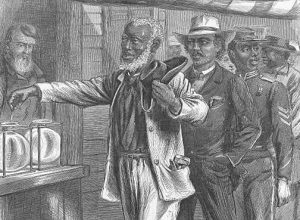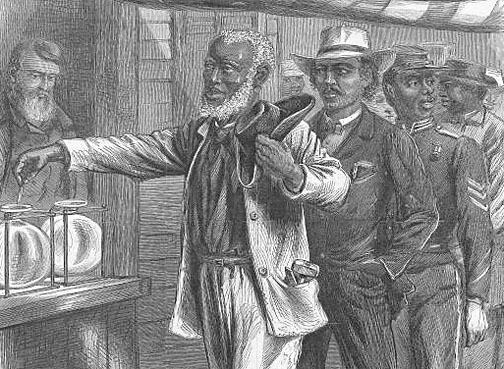By JOSEPH & JUDIE PALMER
Special to the Gazette
Picking up where we left off with Aaron Rice’s story, we had discussed how he and his family along with others had founded the African Methodist Episcopal Church. Not only did it serve as a place for worship, but it also served as their community center to congregate and discuss the political and community issues and events of the day.
However, this was not the only location available to them for socializing and exchanging information. Joseph Hatton’s Barber Shop, located at 126 Main Street, Napa across from the Napa Opera House also served as a hub of the African-American community. Their barber shop sat alongside the Napa Creek which fed into the Napa River, where steamers stopped and delivered newspapers at the wharf. As mentioned before, both Joseph and his father, Edward, were field agents for the African-American San Francisco newspapers, the Pacific Appeal and the Elevator.
In Eunsun Celeste Han’s dissertation, All Roads Lead To San Francisco: Black Californian Networks of Community and the Struggle for Equality 1849-1877, he writes “Aside from carrying letters, parcels, and people, the steamers helped circulate one of the most crucial mediums of nineteenth century community building: Newspapers. Newspapers at this time were more than just daily or weekly pages of recent news. They were the great bulletin board for the public, and if they were the organ of one specific group of people, then they also served as the primary contributor to defining, expanding, and sustaining the boundaries of that community.
Black Californians learned of every upcoming event, newly opened black business, Sunday schedules of black churches in various different cities, the prominent political issues of the day, and the birth, death, weddings, and injuries of black people up and down the Pacific Coast.”
When the news arrived that the Fifteenth Amendment had been ratified on February 5, 1870, Aaron and his community celebrated. On March 30, 1870, Phillip Bell wrote in his newspaper, the Elevator, “PROGRESS OF LIBERTY! Gloria triumphe! We are free! The Fifteenth Amendment which confers upon us full rights of citizenship has received the ratification of the requisite number of States.” However, the road to passage and therefor implementation of the Fifteenth Amendment in California was not an easy one.
In Stacy Smith’s March 5, 2014 article, California’s Last Slave Case, she states, “In 1867, a revived California Democratic Party pledged to stall the extension of voting rights to black men.
Democrats argued that giving the vote to one nonwhite group would inevitably lead to the enfranchisement of Chinese immigrants.” Californian Democrats were really concerned about the invasion of Chinese immigrants, who outnumbered African-Americans in California by a ten-to- one ratio. Stacy Smith continues, “The Democratic promise of “no Negro or Chinese suffrage” appealed to members of California’s growing anti-Chinese movement, and they swept the state elections. Over the next three years, the Democratic legislature refused to ratify the 14th Amendment, which would guarantee African-American civil rights, and rejected the 15th Amendment, which would give voting rights to black men.”
In an effort to put pressure on the California Legislature to ratify the amendment, both the Elevator and the Pacific Appeal sponsored efforts to preregister African-Americans throughout the state to vote. In the November 26, 1869, Number 34 issue of The Elevator, a section reads,
“Joseph Hatton, a black barber in Napa, California, issues a list of the prospective voters in his area.” Aaron along with his son Nathaniel Rice, his father Rev. Robert Rice and 35 other AARON RICE members of the Napian African-American community eagerly went to Joseph Hatton’s Barbershop to become a member of that list.
From a March 12, 1870 Harper’s Weekly illustration, California is depicted along with the states of NJ, NY, KY, MO and DE as nothing more than “flies” trying to bother a happy African- American as he casts his vote. Voting was taken very seriously by the community as this was a right they had long fought for. As the cartoon portrays, they just “shooed” the California fly away to finally be recognized as full-fledged citizens of the United States.

The Napa County Reporter recorded the events of April 11, 1870 in detail with the unfortunate racist slant reflected by the previously mentioned Democrats, “At about noon a couple of anvils were brought into requisition, and made to play the part of a cannon. At or near 1 o’clock in the afternoon the exercises of the day commenced in Hartson’s Hall. Prayer was offered up to the Most High, and was followed by singing. Fred Sparrow acted as President of the day and Joseph Hatton as Vice President. Thomas Gains read the 13th, 14th, and 15th Constitutional
Amendments. Music. Then came the oration by Mr. Hillery of San Francisco – a genuine but pretty smart darkey. Hillery is a good speaker, and as he was speaking in behalf of his own race his remarks brought forth the most enthusiastic applause from his colored countryman. Like most darkies Hillery has a full appreciation of the humorous, and besides is something of a wag himself; consequently he kept quite a crowd in a good humor for some time. We will not refer particularly to his remarks, but (unreadable) say his reflections upon foreigners was entirely out of place, more particularly as there were a number present. If the negro expects to be a good citizen he must not allow prejudice to get the better of him.
“The festivities of the day passed off agreeably to the colored people, and nothing occurred to mar or interfere with their jollification.
“In the evening they set a collision in Quinn & Williams Hall, and sang, marched around the room and enjoyed themselves until near midnight.”
Shortly after, voting registration began in Napa with Frederick Sparrow, a 27-year- old barber in Napa City, as the first to register at the County Court House. Aaron and his family followed shortly thereafter as they took their rights as citizens and the ability to vote very seriously. From the 1875 Great Register of Napa County, CA, Aaron first registered to vote on April 16, 1870.
He is listed as 49, born in NC and a Farmer with registration #2601 and voting #2081. From the 1880 Great Register of Napa County, CA, on Oct 3, he is now listed as age 59, still a farmer with registration #1983 and voting #2578. Aaron voted religiously and never missed an opportunity to do so before he died at the age of 87.
As a side note, it took the civil rights movement of the 1950s and 1960s before California finally ratified the Fourteenth Amendment in 1959 and the Fifteenth Amendment in 1969.
For more information, or to get volunteer with the Martinez Historical Society’s – Potter’s Field Restoration Project, please visit our website MartinezCemetery.org. Do you have a Potter’s
Field resident story to tell? We welcome any pictures or information on anyone or anything regarding Potter’s Field. Please email us at martinezcemetery@gmail.com or call us at (925) 335-9396.
The Martinez Historical Society is recognizing Women’s History Month 2018 during the month of March at the Martinez Museum with a wonderful exhibit titled “Celebrating the Women of Martinez”, created and curated by Mary Goodman.
Martinez Museum – 1005 Escobar Street, and corner of Court Street. Open Tues and Thurs 11:30 a.m. to 3p.m. First 4 Sundays 1-4 p.m. 925-228- 8160; www.martinezhistory.org.
Contra Costa County History Center – 610 Main Street, Martinez. Open Tues through Thurs, 9 a.m. to 4 p.m.; 3rd Saturdays, 10 a.m. to 2 p.m. 925-229- 1042; www.cocohistory.com.






If the Federal Government ratifies a law, it is law and the 14th Amendment to the US Constitution was ratified in 1868. The 15th in 1870. A state or local government can change that law, but in the case you describe they were not changing it–just agreeing with it 100 years later. And anyway, you prove that voting by blacks occurred in 1870. You do know we had our own black man building hotels right here in Martinez in the 1800s? One of his buildings is still standing, although moved.